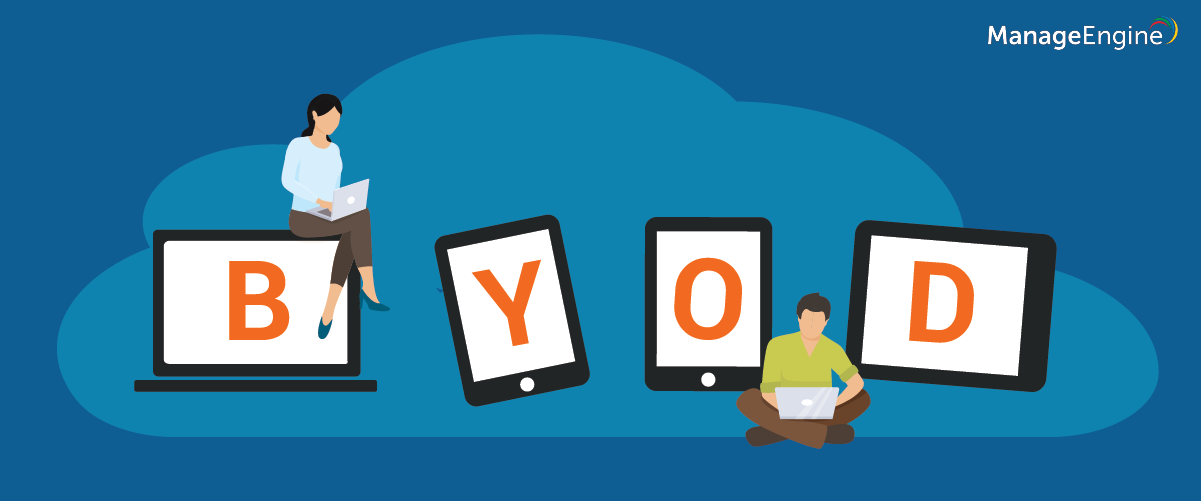 As the COVID-19 pandemic continues to force employees to work from home, businesses are facing new and unique challenges to ensure business continuity. When remote work is mandated due to COVID-19, the transition isn’t smooth for many businesses; not every business has the infrastructure to make the abrupt shift, even given the immediate need to go remote.
As the COVID-19 pandemic continues to force employees to work from home, businesses are facing new and unique challenges to ensure business continuity. When remote work is mandated due to COVID-19, the transition isn’t smooth for many businesses; not every business has the infrastructure to make the abrupt shift, even given the immediate need to go remote.
The foremost challenge is the immediate procurement of devices to maintain employee productivity during telecommuting. Most businesses have no choice but to implement a bring your own device (BYOD) program that allows employees to use their personal devices for work in order to ensure business continuity. BYOD provides a host of benefits, including reduced hardware acquisition costs, lower employee attrition rate, higher productivity, seamless transition to remote work, and more.
When Nebraska Medicine health system and the University of Nebraska Medical Center began a BYOD initiative in June 2019, only 15 percent of 14,000 eligible employees and students used it. The BYOD program, that began as a proposal to enhance security and lessen overcrowding on campus, quickly expanded to help 90 percent of the students transition to remote work scenarios that are indispensable in coping with the ongoing COVID-19 crisis.
However, BYOD comes with its own set of challenges; with the right mobile device management (MDM) solution, you can mitigate these challenges and leverage a host of remote security and management capabilities. What are the major challenges, and how can a MDM solution help overcome them?
1. Device disparity
In organizations following an Employee Provided Device (EPD) policy, the devices are procured from a limited number of OEM vendors which simplifies device management. However, when employees’ personal devices are used during remote work, it becomes challenging for IT admins to manage various types of devices running different OSs.
Mobile device management solutions can manage both BYOD and corporate devices that come from different manufacturers and OS providers. As a result, organizations do not have to impose strict restrictions on permitted devices.
2. Data leakage
The data present within remotely deployed devices must be secured to prevent access by unauthorized users and apps. This introduces two different policy areas: security for corporate data and user-privacy for employees’ personal data, since corporate data and employees’ personal data coexist in these devices.
The ability to create corporate containers in personally-owned devices helps maintain data integrity and user privacy. You can store your corporate data within the encrypted container, and also ensure that MDM solutions cannot access employees’ personal data present outside the corporate space.
3. Secured network access
With a remote workforce, organizations must ensure that employees can access corporate resources from anywhere, at any time; access to the right tools and data makes it convenient for employees to stay productive. However, from a security standpoint, organizations must focus on strengthening their corporate network so that business-sensitive data can only be accessed through a secured channel.
A virtual private network (VPN) can be configured to establish a secure connection so your distributed workforce can safely access confidential data. You can also automatically establish VPN connections on devices for employees to access specific corporate apps or domains.
4. Lost or stolen devices
Since mobile devices in a BYOD environment are meant for the employees’ personal use as well, the probability of them being misplaced, stolen, or falling prey to cybercriminals is high. As crucial as it is to retrieve these devices, it is even more crucial to securely recover the data present in them.
With remote security commands, you can track the geographical location of such devices, raise alarms, remotely lock them, and selectively wipe the corporate data present in them as well. You can also mark devices as “lost”, enabling you to access their lock screens to display customized messages and contact information.
Mobile Device Manager Plus is a mobile device management solution that provides remote security and management capabilities to enable BYOD, as well as manage corporate devices. It supports devices running Android, iOS, macOS, Windows, Chrome OS, and much more. Learn more on how to ensure business continuity while going remote, using Mobile Device Manager Plus.
Start your fully functional, 30-day free trial of Mobile Device Manager Plus today!

